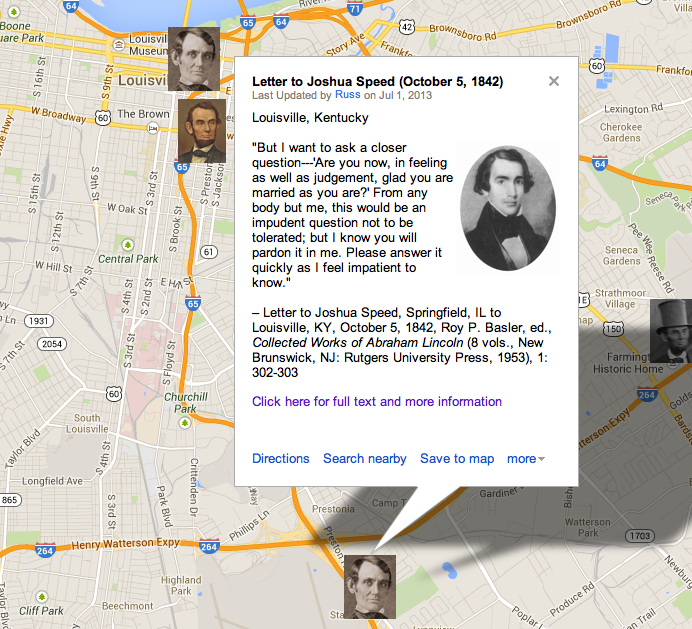Ranking
#79 on the list of 150 Most Teachable Lincoln Documents
Annotated Transcript
“You have heard of my duel with Shields, and I have now to inform you that the duelling business still rages in this city.”
On This Date
HD Daily Report, October 5, 1842
The Lincoln Log, October 5, 1842
Custom Map

View in Larger Map
How Historians Interpret
“A week after that wedding in Jacksonville, Lincoln asked Joshua Speed a pointed question: “Are you now in feeling as well as judgement, glad you are married as you are?” He acknowledged that such a query would be ‘impudent’ coming from anyone but himself, but he was sure Speed would pardon him. ‘Please answer it quickly as I feel impatient to know.’ Lincoln believed he could not wed Mary Todd unless Speed had found happiness in matrimony. In reply, Speed advised Lincoln ‘as a friend not to hesitate or longer doubt that happiness would be the result of his marriage to Miss Todd, giving his own experience of depression and melancholy before he and Miss Henning had finally made up and determined to risk their happiness in each other’s keeping.’”
Michael Burlingame, Abraham Lincoln: A Life (2 volumes, originally published by Johns Hopkins University Press, 2008) Unedited Manuscript by Chapter, Lincoln Studies Center, Volume 1, Chapter 6 (PDF), 580-581.
“Dueling had been outlawed in Illinois in 1839, but the seriousness of the issue was such that Lincoln agreed to meet Shields for a duel in Missouri. Lincoln, not as skilled a marksman as Shields, chose broadswords as his weapon of choice, a weapon much to his long-armed advantage. The men crossed the Mississippi to Missouri, but at the last moment the duel was called off. Perhaps, the absurdity of the weapons ended the affair. Nonetheless, Lincoln’s gallant effort and the protection of her honor must have impressed Mary Todd. Still reserved, Lincoln needed assurance from Speed that his own marriage was happy. Speed later claimed, ‘If I had not been married & happy… [h]e would not have married.’ Abraham Lincoln and Mary Todd married hastily on November 4, 1842, before the groom entertained any more doubts.”
Jean E. Friedman, Abraham Lincoln and the Virtues of War (Santa Barbara: Praeger 2015), 14.
NOTE TO READERS
This page is under construction and will be developed further by students in the new “Understanding Lincoln” online course sponsored by the House Divided Project at Dickinson College and the Gilder Lehrman Institute of American History. To find out more about the course and to see some of our videotaped class sessions, including virtual field trips to Ford’s Theatre and Gettysburg, please visit our Livestream page at http://new.livestream.com/gilderlehrman/lincoln
Searchable Text
Springfield, Oct. 5 1842
Dear Speed:
You have heard of my duel with Shields, and I have now to inform you that the duelling business still rages in this city. Day-before-yesterday Shields challenged Butler, who accepted, and proposed figh[t]ing next morning at sun-rising in Bob. Allen’s meadow, one hundred yards distance with rifles. To this, Whitesides, Shields’ second, said “No” because of the law. Thus ended, duel No. 2. Yesterday, Whitesides chose to consider himself insulted by Dr. Merryman, and so, sent him a kind of quasi challenge inviting him to meet him at the planter’s House in St. Louis on the next friday to settle their difficulty. Merryman made me his friend, and sent W. a note enquiring to know if he meant his note as a challenge, and if so, that he would, according to the law in such case made and provided, prescribe the terms of the meeting. W. Returned for answer, that if M. would meet him at the Planter’s House as desired, he would challenge him. M. replied in a note, that he denied W’s right to dictate time and place; but that he, M, would would [sic] waive the question of time, and meet him at Louisiana Missouri. Upon my presenting this note to W. and stating verbally, it’s contents, he declined receiving it, saying he had business at St. Louis, and it was as near as Louisiana. Merryman then directed me to notify Whitesides, that he should publish the correspondence between them with such comments as he thought fit. This I did. Thus it stood at bed time last night. This morning Whitesides, by his friend Shields, is praying for a new—trial, on the ground that he was mistaken in Merrymans proposition to meet him at Louisiana Missouri thinking it was the State of Louisiana. This Merryman hoots at, and is preparing his publication—while the town is in a ferment and a street fight somewhat anticipated.
But I began this letter not for what I have been writing; but to say something on that subject which you know to be of such infinite solicitude to me. The immense suffering you endured from the first days of September till middle of February you never tried to conceal from me, and I well understood. You have now been the husband of a lovely woman nearly eight months. That you are happier now than you were the day you married her I well know; for without, you would not be living. But I have your word for it too; and the returning elasticity of spirits which is manifested in your letters. But I want to ask a closer question—“Are you now, in feeling as well as judgement, glad you are married as you are?” From any body but me, this would be an impudent question not to be tolerated; but I know you will pardon it in me. Please answer it quickly as I feel impatient to know.
I have sent my love to your Fanny so often that I fear she is getting tired of it; however I venture to tender it again.
Yours forever
LINCOLN

